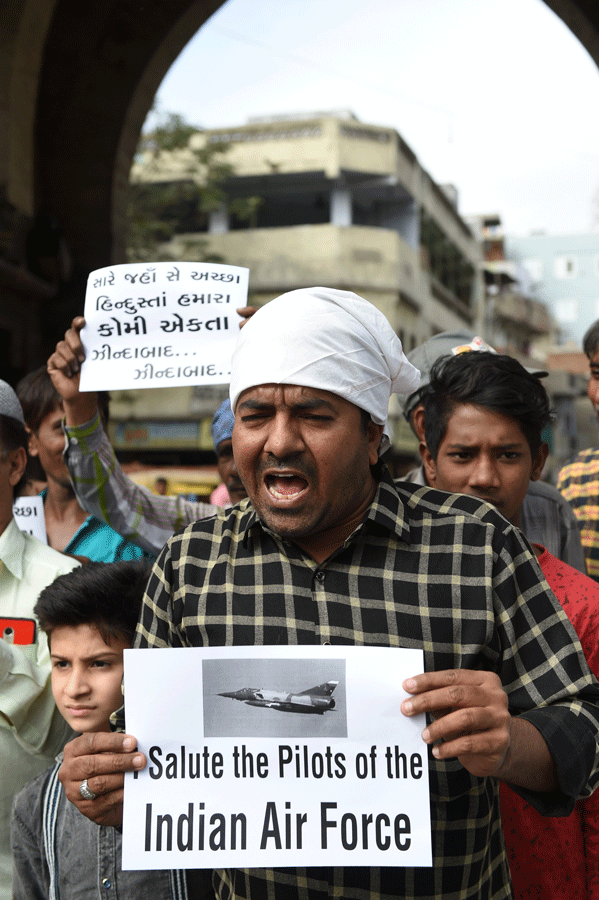Modi’s Electoral Compulsion
By K. K. Shahid | Cover Story | Published 6 years ago

Indians in Ahmedabad celebrate the IAF air strikes.
As Pakistan was preparing to host Saudi Crown Prince Mohammad bin Salman in Islamabad, war threats were echoing in New Delhi, with India pointing its finger at Pakistan for the attack. In an address on February 19, Prime Minister Imran Khan told India that if it was able to provide actionable intelligence, he would initiate an investigation, but added that if it acted aggressively, Pakistan would retaliate.
In the immediate aftermath of Khan’s address to the nation, Pakistan initiated a crackdown on a prominent JeM madrassa in Bahawalpur, but the government subsequently claimed that it was an ordinary seminary with no links to JeM.
The Bahawalpur madrassa is known to be the ideological centre of JeM, while the group’s militant stronghold is in Karachi, reveals security analyst Aoun Sahi.
“Their militant centres are separate from the madrassas. These madrassas actually do teach students.” However, he acknowledged, “Their actual [militant] centres are in [Azad] Kashmir, and in Mardan as well.”
The IAF jets’ bombing target was along the border of Khyber Pakhtunkhwa (KP) and Azad Kashmir. With the bombs actually falling in KP, many interpret the Indian attack as one inside Pakistan and not just the disputed territory of Kashmir.
However, there are no JeM madrassas within proximity of the target site. This prompted the ISPR’s invitation to global and Indian media personnel and officials to visit the area for themselves.
Even so, it remains hard to link these seminaries to JeM, given that the group has been formally banned in Pakistan since 2002, and is currently working under various banners.
“Right now, it’s not working under [the] banner of JeM in Pakistan,” says Sahi. “JeM, theoretically speaking, is a banned organisation in Pakistan. So it won’t be easy to initiate a crackdown as these guys have been working under [other banners].” One of these banners is the Al-Rehmat trust.
Pakistan’s crackdown in Bahawalpur was a response to global pressure on Islamabad to eliminate jihadist safe havens in the country, even while China assured Pakistan of its continued support in the United Nations. China has, in the past, vetoed India’s move to designate the JeM chief as a global terrorist at the UN. Similarly, Crown Prince Mohammed bin Salman, in his joint statement in Islamabad, urged India to “avoid politicisation of the UN listing regime.” However, post the near-war situation after the aerial sorties by the two countries into each other’s territories, there is a murmuring in government and political circles that Pakistan may ask China to give up its opposition to the declaration of the JeM as a terror organisation.
That aside, the increasing general sentiment in Pakistan is that the Bharatiya Janata Party (BJP)-led government is fanning anti-Pakistan war hysteria ahead of the upcoming general elections. That is the position reiterated by Pakistani officials and the PM, in his address to India.
While many express concerns about the reaction of the global powers, there is a significant percentage among the government and military officials who maintain that the Pulwama attack was an ‘inside job.’ This opinion is reiterated by Shamshad Ahmed, a former foreign secretary of Pakistan, who says: “With elections coming up in India, the [Narendra] Modi-led Indian government had to cook up something to gain traction and cash in on populist sentiments. It’s normal for such attacks to be created to malign Pakistan.”
Pakistan repeatedly questions New Delhi’s policies on Indian-held Kashmir and condemns the use of violence and the subjugation of human rights.
“Pakistan denies and instead questions whether Pulwama too could be an inside job,” says geopolitical analyst and Pakistan Today’s Opinion Editor, Shahab Jafry. “The argument this time [is] that with the Saudi prince’s visit, the FATF [Financial Action Task Force] meeting and the [Kulbhushan] Yadav trial, not to mention the upcoming Indian election, perhaps they did it for their own reasons.”
Umair Jamal, a professor of International Relations and a correspondent at The Diplomat, believes that both Pakistan and India need to look inwards amidst the warmongering. “The response concerning blasting Pakistan, fits into a broad discourse which India peddles as a central issue to the Kashmir crisis: Islamabad supports and shelters militant groups that are the reason for ongoing militancy in the valley,” he says. “To contain domestic anger, the first go-to option is always to blame Pakistan and promise punitive action against the country.” Jamal adds, “What Pakistan can do at this point… is to arrest the JeM leadership as it doesn’t help Pakistan’s case internationally.”
With February’s FATF meeting in Paris also questioning Pakistan’s actions, or lack thereof, against groups linked to Hafiz Saeed and the JeM, analysts feel Pakistan would have to act against these outfits for the sake of its own interests.
Meanwhile, as India and Pakistan attack each other, both verbally and militarily, there are calls to restrict the conflict to diplomatic channels now that both sides have conducted cross-border raids on successive days.


